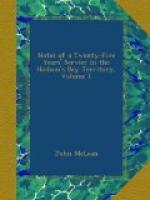It is said by some that the Esquimaux abandon their aged parents: from inquiry, as well as observation, I am led to believe there is no foundation for the charge. It is not reasonable to expect that the more refined feelings of humanity should be found in the breast of a savage, or that he should honour his father and mother in the same degree as he whose principles are moulded by the precepts of Christianity; yet I must do them the justice to say, that they appeared to me to treat their parents with as much kindness, at least, as any other savage nation I have met with. They do not deny, however, that old people no longer able to provide for themselves, and without any relative to care for them, are sometimes left to perish.
No people suffer more from hunger than the Esquimaux who inhabit the shores of Ungava Bay; seals being extremely scarce in the winter season, and no fish to be found; so that the poor creatures are often reduced to the most revolting expedients to preserve life. An Esquimaux, who had been about the post for two years, proceeded, in the winter of 1839, to join some of his relatives along the coast. When he returned in the ensuing spring, I observed that his mother and one of his children were missing. On inquiring what had become of them, he replied, that they had been starved to death, and that he and the rest of his family would have shared their fate, had it not been for the sustenance the bodies afforded.
The Esquimaux always pass the winter near the element that yields them their principal subsistence; and as they are unacquainted with the use of snow-shoes, they cannot follow the deer any distance from the coast. As soon as the rivers are free from ice in summer, they proceed inland and find abundance of food. Their manner of preserving their meat is quite characteristic. When an animal is killed the bowels are extracted, then the fore and hind quarters are cut off, and being placed inside the carcass, are secured by skewers of wood run through the flesh. The whole is then deposited under the nearest cleft of rock, and stones are built round so as to secure it from the depredations of wild animals until the hunters return to the coast; when the meat is in high flavour, and considered fit for the palate of an Esquimaux epicure.
The Esquimaux do not share their provisions as the Nascopies do, although they relieve each other’s wants when their means can afford it: each individual engaged in the chase retains his own game, his claim being ascertained by distinctive marks on the arrows. When a whale is killed a rigid fast is observed for twenty-four hours, not in gratitude to Providence, but in honour of the whale, which is highly displeased when this is neglected, studiously avoiding the harpoon afterwards, and even visiting the offender with sickness and other misfortunes.




